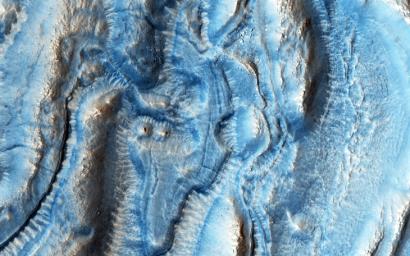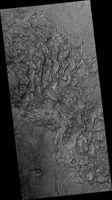
|
A Tale of Two Flows
- Click the image above for a larger view
- Full-Res JPEG (2880 x 1800) (982.3 kB)
- Full-Res TIFF (2880 x 1800) (15.6 MB)
Caption:

Map Projected Browse Image
Click on the image for larger version
This image was taken in one of the regions on Mars well-known for its viscous flow features (VFF), which are massive flowing deposits believed to be composed of a mixture of ice and dust similar to glaciers on Earth.
In this particular region, an impact event occurred creating ejecta deposits that also appear to flow (probably because of their similarly ice-rich composition), and interact with the flows from the VFF. Looking closer , we can see that the VFF deposits (on the right) appear to be rougher in appearance than those of the impact ejecta.
We will need to study this image in more detail to understand how these flows have interacted with each other and what they can tell us about their composition and their flowing behavior properties.
Background Info:
The University of Arizona, Tucson, operates HiRISE, which was built by Ball Aerospace & Technologies Corp., Boulder, Colo. NASA's Jet Propulsion Laboratory, a division of the California Institute of Technology in Pasadena, manages the Mars Reconnaissance Orbiter Project for NASA's Science Mission Directorate, Washington.
Cataloging Keywords:
| Name | Value | Additional Values |
|---|---|---|
| Target | Mars | |
| System | ||
| Target Type | Planet | |
| Mission | Mars Reconnaissance Orbiter (MRO) | |
| Instrument Host | Mars Reconnaissance Orbiter | |
| Host Type | Orbiter | |
| Instrument | High Resolution Imaging Science Experiment (HiRISE) | |
| Detector | ||
| Extra Keywords | Color, Dust, Impact, Map | |
| Acquisition Date | ||
| Release Date | 2016-01-27 | |
| Date in Caption | ||
| Image Credit | NASA/JPL-Caltech/Univ. of Arizona | |
| Source | photojournal.jpl.nasa.gov/catalog/PIA20370 | |
| Identifier | PIA20370 | |
